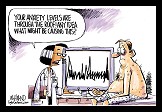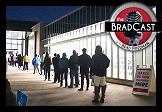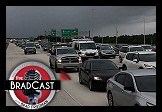Scientific Report Finds 'Serious Security Vulnerability' Similar to 'Princeton Diebold Virus Hack' in Widely Used iVotronic System, Allowing a Single Person to Change Election Results Across Entire County Without Detection
Despite GAO Confirmed Mandate to Serve as Info 'Clearinghouse,' Embattled EAC Says They Will Take No Action to Alert Elections Officials, Public
By Michael Richardson and Brad Friedman
 While revelations surrounding the mysterious 18,000 "undervotes" in the November 2006 U.S. House election between Christine Jennings and Vern Buchanan in Florida's 13th Congressional district continue to inform the nation about the dangers of electronic voting machines, new information has recently come to light exposing a shocking lack of responsible oversight by those entrusted with overseeing the certification of electronic voting systems at the federal level.
While revelations surrounding the mysterious 18,000 "undervotes" in the November 2006 U.S. House election between Christine Jennings and Vern Buchanan in Florida's 13th Congressional district continue to inform the nation about the dangers of electronic voting machines, new information has recently come to light exposing a shocking lack of responsible oversight by those entrusted with overseeing the certification of electronic voting systems at the federal level.
An investigation into what may have gone wrong in that election has revealed a serious security vulnerability on some, and possibly all, versions of the iVotronic touch-screen voting system widely used across the country. The iVotronic is a Direct Recording Electronic (DRE) touch-screen voting machine manufactured by Elections Systems & Software, Inc. (ES&S), the nation's largest distributor of such systems.
 The vulnerability is said to allow for a single malicious user to introduce a virus into the system which "could potentially steal all the votes in that county, without being detected," according to a noted computer scientist and voting system expert who has reviewed the findings.
The vulnerability is said to allow for a single malicious user to introduce a virus into the system which "could potentially steal all the votes in that county, without being detected," according to a noted computer scientist and voting system expert who has reviewed the findings.
And yet, despite their federal mandate to serve as a "clearinghouse" to the nation for such information, a series of email exchanges between an Election Integrity advocate and officials at the U.S. Elections Assistance Commission (EAC) has revealed that the federal oversight body is refusing to notify states of the alarming security issue.
The recent email conversation shows that even in light of the EAC's review of the warning from the computer scientist who characterized the "security hole" as severe, needing to be "taken very seriously," and among the most serious ever discovered in a voting system, the EAC is unwilling to take action.
Recent reports by the Government Accountability Office (GAO) have taken the EAC to task for a failure to meet their legislated mandate for informing the public and elections officials about such matters. However, a review of the email communications to and from the EAC's Jeannie Layson shows that the federal body is steadfast in their refusal to take action to alert either elections officials or the public about the security risk recently discovered by a team of eight noted computer scientists.
The EAC's current Chairwoman, Executive Director, Director of Voting System Certification, and other top officials at both the National Association of State Election Directors (NASED), and even the GAO, were included in the series of email communications, The BRAD BLOG has learned.
The vulnerability was initially discovered by a panel of scientists convened by the State of Florida to study the possible causes for the FL-13 election debacle. The team's discovery revealed that a design issue in the widely used iVotronic system could allow for a viral attack, by a single individual, which could then spread unnoticed throughout the electronic election infrastructure of an entire county.
A similar vulnerability was found in DRE touch-screen system made by Diebold last Summer by a team of computer scientists at Princeton University.
Attempts to seek information about EAC plans to notify other states and local jurisdictions that use the same vulnerable voting systems as the ones in FL-13 have been met with an astounding refusal, troubling denial, buck-passing, and a lack of accountability by the federal commission of Presidential-appointees. The agency has also come under fire in recent weeks for a number of questionably partisan decisions and other failures to perform as mandated by the Help America Vote Act (HAVA) of 2002.
Of late, the EAC has been forced to respond to a great deal of controversy, on a number of different operational matters and policies, as revealed by a series of articles on this site and in mainstream outlets such as the New York Times and USA Today. Several of those matters have drawn Congressional notice, questioning of EAC officials, and letters of inquiry. Thus, this latest revelation is likely to add to the rising concern of Congress members as new federal legislation introduced by Rep. Rush Holt (D-NJ), currently facing mark-up by a Congressional committee, would permanently fund the now-embattled EAC. Funding for the agency was originally mandated by HAVA only through 2005.
The new ES&S iVotronic vulnerability first emerged on February 23, 2007, when the Florida Dept. of State released a report detailing their findings from the investigation into what happened in Sarasota's still-contested Jennings/Buchanan race. That election was ultimately decided by just 369 votes. The state's official findings included a report [PDF] conducted by an eight-member computer science and technology team under the auspices of Florida State University (FSU). The report sought, unsuccessfully, to determine the cause of the unexplained "undervotes" reported by the iVotronic touch-screen voting systems used in Sarasota's portion of the FL-13 race on Election Day and in early voting.
Although the reason thousands of votes turned up missing from those systems remained unknown, the study team did discover a serious security flaw in the iVotronic system that is used in Sarasota and many other jurisdictions across the country (and even the world, as France is set to use the same systems in their upcoming Presidential Election.)
Election integrity watchdog John Gideon, a frequent BRAD BLOG contributer and the Co-Director and Information Manager for VotersUnite.org, says that the security flaw may pertain to "every ES&S iVotronic voting machine used in the US and overseas." A total of eight separate versions of the system --- without and without so-called "voter verified paper audit trail" (VVPAT)" printers --- are currently approved as qualified at the federal level, he explained. Three of those are definitely affected and it is likely that the others are as well.
The details, the dangers, and the denials are all described below...
--- Click here for REST OF STORY!... ---
 For those linking in from Joe Conason's NY Observer column today on the GOP's phony "voter fraud" claims in general, and the very real voter fraud committed by Republican celebrity Ann Coulter... Here's our Special Coverage page on Coulter's felony, which offers a great deal of documentation, including her felonious Florida Voter Registration Application from 2005.
For those linking in from Joe Conason's NY Observer column today on the GOP's phony "voter fraud" claims in general, and the very real voter fraud committed by Republican celebrity Ann Coulter... Here's our Special Coverage page on Coulter's felony, which offers a great deal of documentation, including her felonious Florida Voter Registration Application from 2005. Color us stunned that George W. Bush's U.S. Attorney down there hasn't found fit to bring a case, since we all know how eager they were to send Democrats to jail (or even deport them) for such things --- even when the "crime" was accidentally committed...unlike the clearly purposeful and fraudulent efforts of Coulter.
Color us stunned that George W. Bush's U.S. Attorney down there hasn't found fit to bring a case, since we all know how eager they were to send Democrats to jail (or even deport them) for such things --- even when the "crime" was accidentally committed...unlike the clearly purposeful and fraudulent efforts of Coulter.


 The GOP 'Voter Fraud'
The GOP 'Voter Fraud' 'Green News Report' 10/31/24
'Green News Report' 10/31/24
 'Closing Arguments'
'Closing Arguments' Trump Promises to be a Lawless, Authoritarian President. Believe Him: 'BradCast' 10/29/24
Trump Promises to be a Lawless, Authoritarian President. Believe Him: 'BradCast' 10/29/24 'Green News Report' 10/29/24
'Green News Report' 10/29/24 Election Heats Up: Ballots Burn, Billionaires 'Obey in Advance', Callers Ring In: 'BradCast' 10/28/24
Election Heats Up: Ballots Burn, Billionaires 'Obey in Advance', Callers Ring In: 'BradCast' 10/28/24 Musk's Privatized Internet Satellite System Threatens U.S. National Security
Musk's Privatized Internet Satellite System Threatens U.S. National Security Sunday 'VOTE NOW!' Toons
Sunday 'VOTE NOW!' Toons Harris on Hope, Trump's Fasc-ism in Bumpy Closing Days: 'BradCast' 10/24/24
Harris on Hope, Trump's Fasc-ism in Bumpy Closing Days: 'BradCast' 10/24/24 'Green News Report' 10/24/24
'Green News Report' 10/24/24 Kelly on Trump: 'Fascist', Admires Hitler, Disrespects Constitution and Disabled Vets: 'BradCast' 10/23/24
Kelly on Trump: 'Fascist', Admires Hitler, Disrespects Constitution and Disabled Vets: 'BradCast' 10/23/24 Accountability Comes For Rudy, Other Election Deniers: 'BradCast' 10/22/24
Accountability Comes For Rudy, Other Election Deniers: 'BradCast' 10/22/24 'Green News Report' 10/22/24
'Green News Report' 10/22/24 Elon Musk's 'Vote Buying' and Lying for Trump: 'BradCast' 10/21/24
Elon Musk's 'Vote Buying' and Lying for Trump: 'BradCast' 10/21/24 Sunday 'High Anxiety' Toons
Sunday 'High Anxiety' Toons 'Green News Report' 10/17/24
'Green News Report' 10/17/24 Fake v. Real Censorship and Trump/Fox Fetish-ized Grievance World: 'BradCast' 10/17/24
Fake v. Real Censorship and Trump/Fox Fetish-ized Grievance World: 'BradCast' 10/17/24 'Americans Aren't Prepared for Trump's Police State': 'BradCast' 10/16/24
'Americans Aren't Prepared for Trump's Police State': 'BradCast' 10/16/24 Good News for Georgia Voters, the Economy and Kamala Harris: 'BradCast' 10/15/24
Good News for Georgia Voters, the Economy and Kamala Harris: 'BradCast' 10/15/24 Fascism Comes to America: 'BradCast' 10/14/24
Fascism Comes to America: 'BradCast' 10/14/24 Institutional Landlords Flood CA Voters With Deceptive Ads on Props 33 and 34
Institutional Landlords Flood CA Voters With Deceptive Ads on Props 33 and 34 Milton's Mess, FL's U.S. House Liars, Trump's Made-in-China Bibles: 'BradCast' 10/10/24
Milton's Mess, FL's U.S. House Liars, Trump's Made-in-China Bibles: 'BradCast' 10/10/24 Whistleblower Org Readies to Support Election Officials: 'BradCast' 10/9/24
Whistleblower Org Readies to Support Election Officials: 'BradCast' 10/9/24 Florida Braces for 'Devastating to Catastrophic' Milton: 'BradCast' 10/8/24
Florida Braces for 'Devastating to Catastrophic' Milton: 'BradCast' 10/8/24
 VA GOP VOTER REG FRAUDSTER OFF HOOK
VA GOP VOTER REG FRAUDSTER OFF HOOK Criminal GOP Voter Registration Fraud Probe Expanding in VA
Criminal GOP Voter Registration Fraud Probe Expanding in VA DOJ PROBE SOUGHT AFTER VA ARREST
DOJ PROBE SOUGHT AFTER VA ARREST Arrest in VA: GOP Voter Reg Scandal Widens
Arrest in VA: GOP Voter Reg Scandal Widens ALL TOGETHER: ROVE, SPROUL, KOCHS, RNC
ALL TOGETHER: ROVE, SPROUL, KOCHS, RNC LATimes: RNC's 'Fired' Sproul Working for Repubs in 'as Many as 30 States'
LATimes: RNC's 'Fired' Sproul Working for Repubs in 'as Many as 30 States' 'Fired' Sproul Group 'Cloned', Still Working for Republicans in At Least 10 States
'Fired' Sproul Group 'Cloned', Still Working for Republicans in At Least 10 States FINALLY: FOX ON GOP REG FRAUD SCANDAL
FINALLY: FOX ON GOP REG FRAUD SCANDAL COLORADO FOLLOWS FLORIDA WITH GOP CRIMINAL INVESTIGATION
COLORADO FOLLOWS FLORIDA WITH GOP CRIMINAL INVESTIGATION CRIMINAL PROBE LAUNCHED INTO GOP VOTER REGISTRATION FRAUD SCANDAL IN FL
CRIMINAL PROBE LAUNCHED INTO GOP VOTER REGISTRATION FRAUD SCANDAL IN FL Brad Breaks PA Photo ID & GOP Registration Fraud Scandal News on Hartmann TV
Brad Breaks PA Photo ID & GOP Registration Fraud Scandal News on Hartmann TV  CAUGHT ON TAPE: COORDINATED NATIONWIDE GOP VOTER REG SCAM
CAUGHT ON TAPE: COORDINATED NATIONWIDE GOP VOTER REG SCAM CRIMINAL ELECTION FRAUD COMPLAINT FILED AGAINST GOP 'FRAUD' FIRM
CRIMINAL ELECTION FRAUD COMPLAINT FILED AGAINST GOP 'FRAUD' FIRM RICK SCOTT GETS ROLLED IN GOP REGISTRATION FRAUD SCANDAL
RICK SCOTT GETS ROLLED IN GOP REGISTRATION FRAUD SCANDAL VIDEO: Brad Breaks GOP Reg Fraud Scandal on Hartmann TV
VIDEO: Brad Breaks GOP Reg Fraud Scandal on Hartmann TV RNC FIRES NATIONAL VOTER REGISTRATION FIRM FOR FRAUD
RNC FIRES NATIONAL VOTER REGISTRATION FIRM FOR FRAUD EXCLUSIVE: Intvw w/ FL Official Who First Discovered GOP Reg Fraud
EXCLUSIVE: Intvw w/ FL Official Who First Discovered GOP Reg Fraud GOP REGISTRATION FRAUD FOUND IN FL
GOP REGISTRATION FRAUD FOUND IN FL
























 While revelations surrounding the mysterious 18,000 "undervotes" in the November 2006 U.S. House election between Christine Jennings and Vern Buchanan in Florida's 13th Congressional district continue to inform the nation about the dangers of electronic voting machines, new information has recently come to light exposing a shocking lack of responsible oversight by those entrusted with overseeing the certification of electronic voting systems at the federal level.
While revelations surrounding the mysterious 18,000 "undervotes" in the November 2006 U.S. House election between Christine Jennings and Vern Buchanan in Florida's 13th Congressional district continue to inform the nation about the dangers of electronic voting machines, new information has recently come to light exposing a shocking lack of responsible oversight by those entrusted with overseeing the certification of electronic voting systems at the federal level. The vulnerability is said to allow for a single malicious user to introduce a virus into the system which "could potentially steal all the votes in that county, without being detected," according to a noted computer scientist and voting system expert who has reviewed the findings.
The vulnerability is said to allow for a single malicious user to introduce a virus into the system which "could potentially steal all the votes in that county, without being detected," according to a noted computer scientist and voting system expert who has reviewed the findings.













